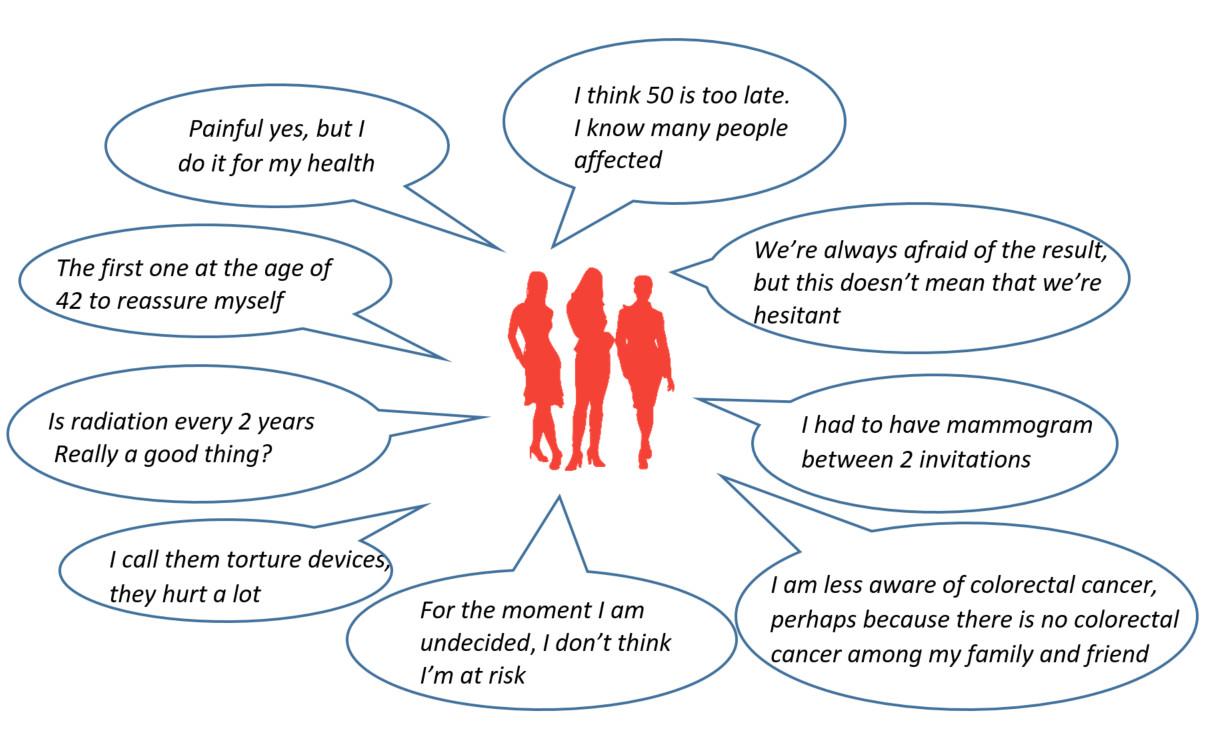PUBLICATIONS: 2 publications studying women’s participation in screening for three cancers have just been published by researchers from the Epicene team
Retour
Two publications studying women’s participation in screening for cancers
have just been published by researchers from the Epicene team
From the age of 50, a French woman is invited to participate in 3 organized cancer screenings (breast, colorectal, cervical*).
What are their behaviors and possible explanations for non-participation?
A questionnaire was proposed to women aged 56 who had been invited to 3 successive organized breast and colorectal cancer screening programs.
Results:
Women with a low level of education participated more in organized screenings compared to those with a higher level of education.
The majority of women had participated in the 3 breast cancer screening programs to which they were invited since their 50th birthday.
Only 6 out of 10 women had also participated in the 3 campaigns for organized colorectal cancer screening and 9 out of 10 had had a smear test in the last 3 years.
Of the women who had never participated in organized breast cancer screening, a majority had also never had organized colorectal cancer screening.
A significant fraction of women performed opportunistic screening for breast and cervical cancer.
Many women are screened before the age of 50, following the recommendation of their gynecologist.
Although not included in the official recommendations, this approach aims to reassure women and professionals.
The main reasons for women’s reservations about participating in screening were:
- Breast cancer screening: painful examination, fear of results, negligence, uncertainty about the benefit of screening. Fear of over-diagnosis was rarely mentioned. Few women said they did not want to participate.
- Colorectal cancer screening: neglect, forgetting or procrastination but also difficulty in obtaining the test, especially for those who rarely consult their physician. The percentage of women who did not feel concerned by colorectal screening is higher than for breast cancer screening.
- Cervical cancer screening: 11.8% of women were late in having their smears. This percentage was 3 times higher in the category of women not participating in other organized screenings.
Participation in one type of screening increases the probability of participating in other screenings. As participation in breast cancer screening is the most important, this adherence could be an interesting lever to raise awareness.
The women surveyed often stated that the invitation to screening system was an opportunity for them, thus recognizing its role in reducing health inequalities.
This survey highlights the importance of health professionals in raising women’s awareness of the benefits of screening and of providing information at the time of the first invitation
Access to the 2 publications
- How do women comply with cancer screenings? A study in four regions of France.
Duchange N, Poiseuil M, Rollet Q, Piette C, Cosson M, Quertier MC, Moutel G, Darquy S. BMC Womens Health. 2023 Apr 21;23(1):190. doi: 10.1186/s12905-023-02311-5. PMID: 37085818 - Participation in breast cancer screening and its influence on other cancer screening invitations: study in women aged 56 years old in four French departments.
Poiseuil M, Moutel G, Cosson M, Quertier MC, Duchange N, Darquy S.
Eur J Cancer Prev. 2023 May 1;32(3):238-245. doi: 10.1097/CEJ.0000000000000777. Epub 2023 Feb 13. PMID: 36779309
Contacts
silviane.darquy@u-bordeaux.fr
marie.poiseuil@u-bordeaux.fr

* At the time of this study, organized cervical cancer screening had not yet been deployed in the country. Screening was therefore only individual during a visit to a health professional: this is known as opportunistic screening.


